| Home -> Paul Elder -> The Rout of the Frost King | |
| The Rout of the Frost King by Eugéne Neustadt | |
| Introduction: | |
| A poem about the Frost King and his battle with the Zephyr's, and poems about Fairies | |
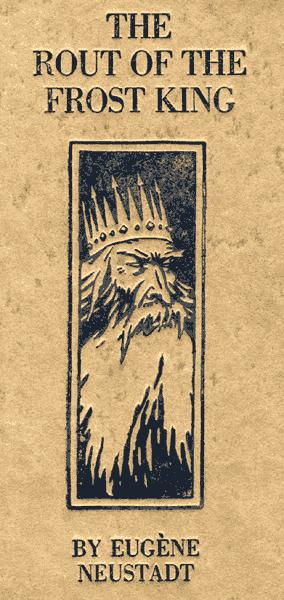 |
|
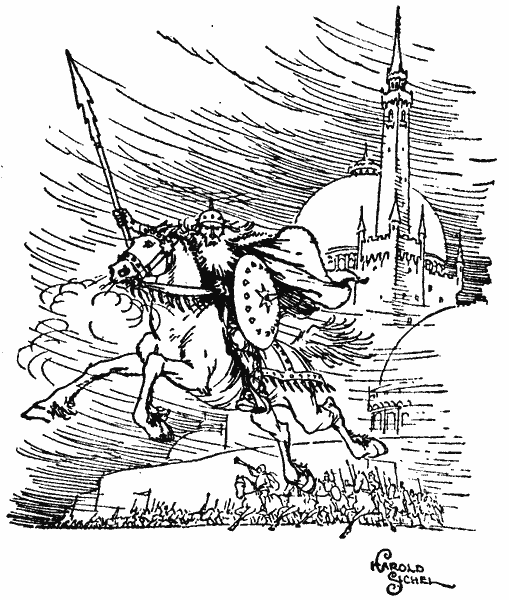 |
|
|
"Then he his snowy steed bestrode,
And with his followers southward rode." |
|
|
|
|
|
The Rout of the Frost King
& Other Fairy Poems By Eugène Neustadt Illustrated by Harold Sichel |
|
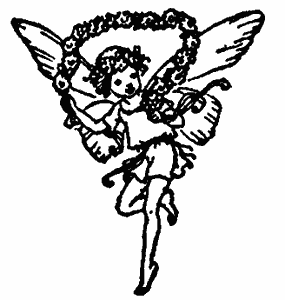 |
|
|
Paul Elder & Company Publishers
San Francisco Copyright, 1914 Paul Elder and Company San Francisco To my beloved wife Née Sofia Newland |
|
|
|
|
|
The Rout of the Frost King
Being A Veritable Account of His Overthrow by the Zephyrs |
|
 |
|
|
Amid the polar regions stands
A palace built of ice and snow, And when the northern light expands And falls upon its domes, they glow Like gems reflecting every hue From rosy-red to palest blue, Till every dome and minaret Appears with countless jewels set. As far as man has power to see, Around the palace lies a plain Of boundless white monotony, O'er which the eye would search in vain For aught but snowpeaks here and there, Uprising in the icy air, And standing out against the sky Like crystals that in splendour vie. The great white wolf and polar bear On sentry stand before the gate Of that mysterious palace where The Frost King dwells in royal state. His army, clad in snowy white, Is in attendance day and night, And big-cheeked winds their trumpets blow, When forth the King intends to go. One day the King, while taking rest, And dreaming of his feud of old Against the Zephyrs from the west, Was startled by these spirits bold, Who, taking from his roof a peep And seeing that he was asleep, Had breathed upon him till he felt The icicles around him melt. The Frost King rose in wrath and pain Because so limp and wet felt he, And when the Zephyrs tried again To breathe on him, he made them flee, By sending forth one icy breath That gripped them like the hand of Death, And drove them from his realm of ice, To warmer climes and fairer skies. As such affront could not be borne, It was a cause for war indeed, He bade Sir Northwind sound his horn And call his icy host with speed. The sound had scarcely died away, When forth there came in white array The army of the Polar King, And round the palace formed a ring. Ten billion Snowsprites danced about, Preparing for their whirling flight, Sir Northwind uttered shout on shout From sheer exub'rance and delight. And when his majesty appear'd Before the gates, the sentries cheer'd; Then he his snowy steed bestrode And with his followers southward rode. Sir Hailstorm with artillery For throwing small shot, joined the throng, And crossing o'er the Arctic Sea, They saw Prince Hoarfrost bring along, By order of his lord's commands, A myriad of light-mounted bands Who were the first to reach the coast To which the Frost King led his host. One thing they could not understand, Was that the hills and plains were green, For in their own white polar land Such curious sight was never seen. The houses were, most strange to say, Not made of ice, but something gray, And feathery things of dark green hue, Twoscore feet high in places grew. And from the roofs dark clouds uprose - (They found out later it was smoke) - That went into Sir Northwind's nose And made him sneeze and cough and choke; The Snowsprites it annoyed a lot, It made them feel so limp and hot; And Hoarfrost said that he should die If on those roofs he had to lie. But suddenly King Frost drew rein And, pointing to the earth below, He said: "On yonder fertile plain And wheresoever green things grow, There live the Zephyrs whose warm breath Is to our brethren certain death. So, let us sweep down from this height, And grip them ere there's time for flight." Because the Zephyrs often roam Like other winds in distant lands, It happened that but few were home, And strayed about in little bands. But when they heard Sir Northwind's roar, And saw the Snowsprites earthwards pour, They knew delay meant sure defeat, And safety sought in fast retreat. "Sir Northwind, ho!" the King roar'd loud, "I see those craven Zephyrs fly! Now, after them, for I have vowed That every one of them shall die! And while you cut off their retreat, The Snowsprites, racing up, will beat These wretches who audaciously Have dared to cross our Arctic Sea." Alas, the Zephyrs were so few That soon they had to make a stand, But, being brought to bay, they threw Themselves upon the hostile band; And as they met with grim intent, Each on his foe's destruction bent, A host of Snowsprites met their death Ere silenced was the Zephyrs' breath. "To us belongs the victory!" Exclaimed the Frost King, with delight. "I'll now send out to bush and tree My Frostsprites, who will kill and blight All green things growing on the earth, And thus produce a fearful dearth." And lo! upon the King's command, The Frostsprites occupied the land. Each bush and tree was filled with dread On being by the Frost King gripped, Each flower hung its tender head, And all were soon of foliage stripped. The birds were silent with affright, And beasts of prey crept out of sight, The sheep took shelter 'neath the hill, The fields and woods lay white and still. No brooklets now could rush along, For they were held as by a vise, And buried lay their merry song Beneath a shroud of snow and ice. In short, it was the Frost King's reign That stretched away from plain to plain; For weeks and weeks he southward went On vengeance and destruction bent. One day, about the first of March, While near the Adriatic shore, And romping round a ruined arch, Sir Northwind gave a mighty roar - For, looking o'er the waves, he saw Ten billion seashells landward draw, While Zephyrs seated in them blew Upon their sails of silv'ry hue. The first shell was the Zephyr King's, His fair head crowned with budding flowers, Of gauzy web were made his wings, His smilax cloak trailed down in showers; Soft rain dripped from his rootlike hair, His perfumed breath spread through the air, And when he reached the shore and blew, The Snowsprites fled and flowers grew. No sooner did the Frost King hear The Zephyrs' army was in sight, And that the Snowsprites, filled with fear, Were much disposed to take to flight, Than up he rose in wildest ire, And bade Sir Hailstorm at it fire The biggest stones at his command, To drive the Zephyrs from the land. Despite the heavy cannonade Which Hailstorm on the Zephyrs threw, Their quick advance could not be stayed, And when resistance feebler grew More Snowsprites came to join the fray; But, warmed by Zephyrs' breath, turned gray And died in myriads on the green On which their forms were no more seen. Sir Northwind shrieked till he was hoarse, The Frost King grimly shook his head, The Snowsprites needs must yield to force, Confusion through his army spread; With wrath his face, once white, turned gray, He felt he dared no longer stay. He bade his army turn in haste And cross the plains it had laid waste. Away, away, he northward rode With soot bespeckled, gaunt and grim, His limp, white hair around him flowed, His wat'ry eyes seemed weak and dim; The crystals from his long cloak dropped Whenever he a moment stopped To gaze upon his fleeing host, Of former glories but a ghost. 'Twas death to those who dared to lag, The Zephyr King would grant no grace, He hoisted on the plains his flag, And then a wond'rous change took place. A billion blossoms raised their heads, The brooklets woke within their beds, The birds struck up a merry glee, And green turned every plain and tree. Old Frost King barely reached his home, Beyond the distant Arctic Sea. 'Twas there he loved to live and roam Upon his plains that knew no tree. Within his icy Palace Hall, On which for months no light would fall, He laid him down and sadly thought Of short-lived glory dearly bought. And then he called his leaders bold Who formed his court in this retreat, And said: "You hardly need be told I don't accept this sore defeat; For when November comes again, Assemble here upon this plain. I'll lead you to the southern shore To fight the Zephyr King once more." |
|
 |
|
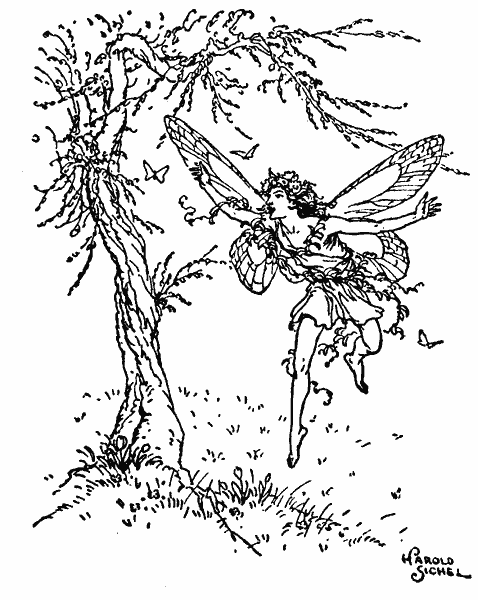 |
|
|
"And when he reached the shore and blew,
The Snowsprites fled and flowers grew." |
|
|
|
|
|
The Fairy-Ring
Founded on an Old German Legend of the Black Forest |
|
 |
|
|
As the moonlight fell
On a dreaming dove That in sylvan dell Nestled near his love, A ring of fairies, fleet and bright, Danced softly, tripping in the light That pierced the leafy domes. Then a magic spark Lit each leaf and flower, And illumed the dark Like a diamond shower, And fireflies swept through the air Or, gently swaying, twinkled there, Like tiny brilliant lamps. Weasels, badgers, moles, Startled by the sight, From their mossy holes Peer into the night, While bats and brilliant butterflies, And moths, with gaudy wings, uprise To see the fairies trip. Rabbits, hares and deer, Birds and beasts of prey, Timidly draw near To the sylvan play, An audience such as ne'er was seen Forms round the fairies on the green, To watch their lithesome dance. Hark! what mystic sound Breaks upon the ear? From the woods around Elves and gnomes appear, They chant a song now sweet, now wild, And in their midst a pale dead child They bring upon a bier. 'Tis their Fairy Queen Whom they fête to-night, And the woods are seen Quivering with delight. To her the lifeless babe they bring, And placing it amid the ring, They wait her magic touch. Lo! the Queen just bends O'er the wan cold face, And with loving hands Loosens Death's embrace. The babe then joins the whirling ring, And round and round the fairies swing, In circles full of grace; Ever on they fly, Faster grows their pace, Flashing past the eye In their elfin race, Till mist and babe and fairies blend And rise, as early dawn doth send Its gray light on the day. - As the sunlight fell On two billing doves In a sylvan dell Where they cooed their loves, No sign of fairies bright and fleet, Of softly tripping, tiny feet, Was seen in all the wood. |
|
 |
|
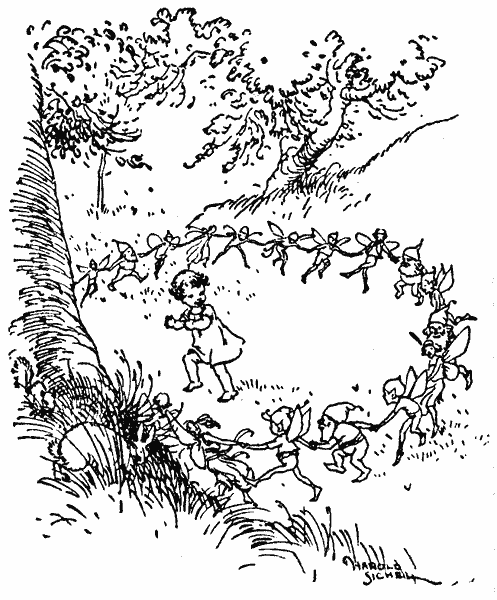 |
|
|
"The babe then joins the whirling ring,
And 'round and 'round the fairies swing." |
|
|
|
|
|
The Bluebell and the Raindrop
Giving an Account of the Latter's Adventures in the Clouds |
|
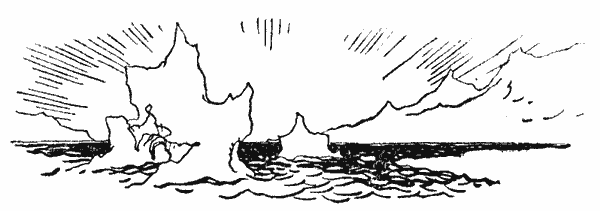 |
|
|
Within a fairy-dell where grew
Soft mosses and purple heather, The Misses Bell, all dressed in blue, A picnic enjoyed together - With some friends who partook with unbounded delight Of the nectar-like dew they had gathered that night, And they nodded their heads in a manner which said, "Let us sip it before its aroma has fled." Among the swains who came to call And court them in gallant fashion, The Bells preferred but three, who all Laid siege to their hearts with passion. For as soon as Beau Bumble was roused from his rest By the first peep of daylight, he quitted his nest And proceeded to wake the young Bells from their sleep, With a serenade sung in a bass rich and deep. His friend and rival, Mr. Bee, A dapper and spruce young fellow, Was sure to join the melody In strains not so deep but mellow. But the favorite suitor who hovered about And who never expressed his devotion right out, Was that fine Mr. Butterfly, gentle and shy, Whose attractions the Bells took no pains to deny. Of course, old Wasp was also there, With Bluebottle so officious That every guest disliked the pair Whose manners were rude and vicious. But despite these small drawbacks the picnic went on Till a cloud overspread the blue sky and began To obscure the warm sun, which so marred the fair day That the guests with a bow to the Bells speed away. Then, suddenly there came a flash, Soon followed by distant thunder; A furious storm began to lash The Bells who were filled with wonder. In amazement and terror each Bell bent her form, To avoid the cold raindrops hurled down by the storm From the heavens above, that oft mirrored the hue Of their smart little frocks of cerulean blue. And while they stood with heads bowed down To shelter from wind and weather, Each drop that struck a true blue gown Was shed on the purple heather; Till Miss Flora (a belle much renowned for her grace, Who with girlish curiosity eyed every place), Was alarmed to observe a small drop of cold rain On her lap, where it lay like a creature in pain. "I wish I knew," quoth Flora Bell, "Those far-off, mysterious regions, From which these lovely raindrops fell Which glitter round me in legions." You will hardly much wonder at Flora's surprise When she saw that small raindrop look right in her eyes, And then heard him pronounce these strange words with a sigh: "I will tell you about them, if here I may lie. "When first I saw the sun's fair light, I sailed on an airy ocean, Where cloud-ships, rigged with sails all white, Were floating in gentle motion. On my cloud-ship were countless small drops just like me, And we traveled above the wide world and could see All the marvelous sights on its wonderful face, All the grandeur of Nature, her beauty and grace. "We saw vast plains in fertile lands Where golden the corn was growing, Traversed by streams resembling strands Of jewels in sunlight glowing. They meandered along till their light seemed to melt In the shade of a forest that formed a green belt At the base of huge mountains, whose purple turned gray Ere it faded amid the blue heavens away. "Above the lonely Polar Sea We floated to snows that blended All things in white monotony As far as the view extended. And beneath us we witnessed the silent display Of an army of icebergs in sparkling array. They appeared to keep watch on the boundless white plain Where the snows of drear winters for ages have lain. "One day we sailed o'er desert lands Which shone like a lake a-blazing, For down upon their blanching sands A merciless sun was gazing. Far apart on this waste a few mounds could be seen, And upon them grew palms on their island of green, Where the cry of wild birds hovering high here and there, Seemed to startle the silence that reigned in the air. "At last our cloud-ship came to grief On nearing a rocky giant, Whose peaks showed up in dark relief, And soared to the sky defiant; And just then we were caught in a current so strong That, despite all resistance it bore us along, And soon we dashed with a terrible force 'Gainst a cloudship rigged black that was crossing our course. "Our sails were rent, the ship broke up, Confusion increased disaster - O'er board went every trembling drop And sinking, went faster and faster Till the ocean of air-waves through which we all sped Had benumbed our bodies and left us like dead. But what happened thereafter I scarcely can tell. All I know is - I woke on your lap, dear Miss Bell." With bated breath Miss Bell had heard The tale of the Drop's disaster, By which her gentle heart was stirred To feelings she scarce could master. When he spoke of that shipwreck far up in the air She determined to nurse and tend him with care, But the Raindrop replied: "Dear Miss Flora, I fear My departure from earth is exceedingly near. "For now the sky is blue again, I feel my small body lifting To yonder sun that sends the rain On thousands of cloudships drifting. Dear Miss Bell, sweetest lady, alas, I must start On my way to the cloudship, and so we must part. But remember, whenever you gaze up on high, I am smiling to you from my ship in the sky. So, when the sun rose up and up, And shone both hotter and brighter, Miss Flora felt the tiny Drop Was growing lighter and lighter. When soon after poor Flora looked down at the place Whence for one glorious hour he had gazed in her face, She was startled to find herself downcast and lone, For along with the Raindrop, her life's joy was gone. - Bright sunshine round the Bluebells played Yet great was their sister's sadness; She wondered where the Raindrop strayed Whose presence had brought her gladness. Mr. Bumble and spruce Mr. Bee could not fail To observe when they called that Miss Flora looked pale And had nothing to say to their banter and jest, 'Twas the Raindrop she loved, and cared nought for the rest. |
|
 |
|
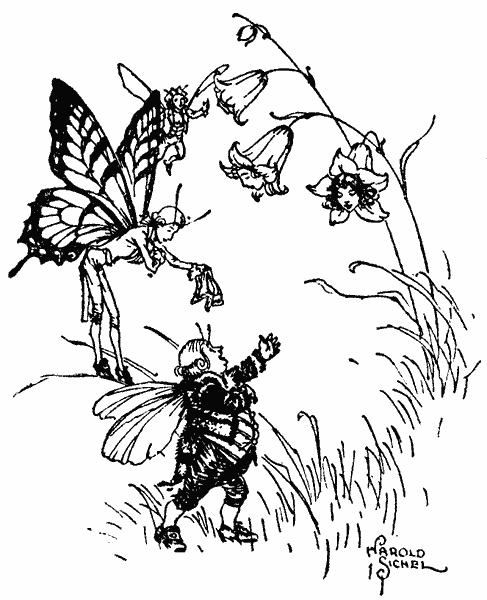 |
|
|
"The swains who came to call,
Laid siege to their hearts with passion." Here Ends The Rout of the Frost King and Other Fairy Poems by Eugéne Neustadt. The Illustrations by Harold Sichel. Published by Paul Elder and Company, and Printed by their Tomoye Press, under the Direction of John Swart, in the city of San Francisco, September, Nineteen Hundred and Fourteen. |
|